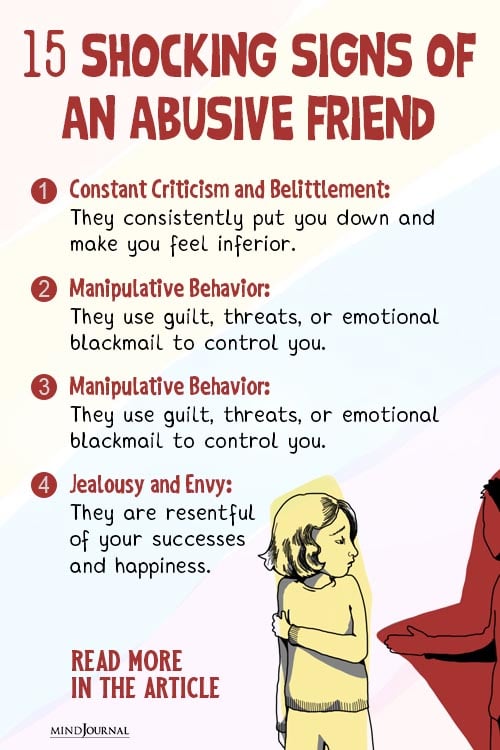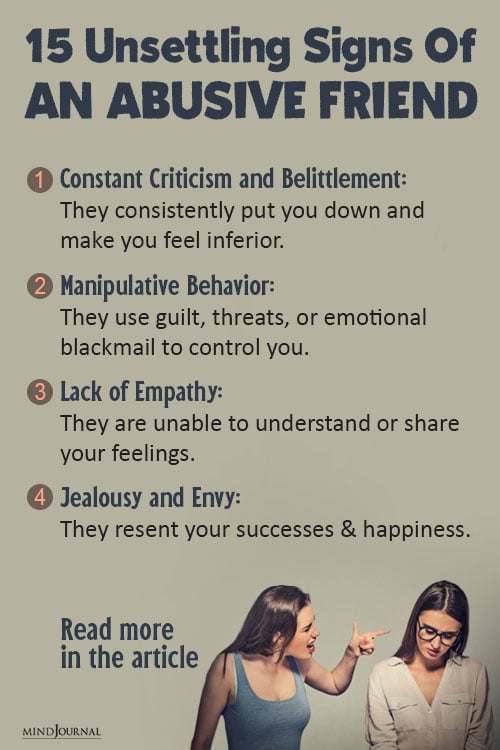Do you feel like your BFF is jealous of you? Do they constantly criticize and always try to influence your decisions? Are they always around when they need a favor from you, but immediately disappear when you need support? Then it is likely you have a toxic, abusive friend. Let us explore the signs of an abusive friend and how to deal with an abusive friend.
A friendship is one of the most authentic and purest forms of relationships we can experience as it is not bound by blood or any compulsion. Friendships are born out of mutual respect, support, companionship and happiness. Our friends support us and pick us up when we are down and guide us when we stray too far.
However, some individuals use the mask of friendship simply to exploit, dominate and abuse us. They pretend to be our friends as long as we are of use to them and frequently exhibit abusive behaviors that can leave deep emotional scars.
Today let us explore the hidden realities of emotionally abusive friendships and identify the warning signs of an abusive friend.
What is an Abusive Friend?
An abusive friend refers to someone who manipulates you, treats you disrespectfully and makes you suffer emotionally. They can be harmful and cause you distress, either mentally, emotionally or physically.
Abusive friendships, unlike healthy ones where both parties build and respect each other, involve power imbalances, emotional manipulation and toxicity. Emotionally abusive friendships often involve emotional abuse, control, manipulation, gaslighting and exploitation.

This is why it is crucial for us to identify the signs of an abusive friend and learn how to deal with an abusive friend.
Related: The 7 Types Of Toxic Friends You Should Stay Away From
Signs of an Abusive Friend
Emotionally abusive friendships have a way of creeping into someone’s life by eroding their self-esteem and well-being. These so-called friendships thrive on control, dominance and exploitation.
Here are some of the most common red flags and signs of an abusive friend that you should be aware of.
1. Constant Criticism and Belittlement
A toxic abusive friend will constantly criticize, humiliate and belittle you, even when there is no reason for it. They do this simply to make themselves feel superior and to make you feel inferior.
They may ridicule your accomplishments, looks or personal choices making you feel worthless and will break your self-esteem with their derogatory remarks.
2. Manipulative Behavior
Abusive friends often manipulate situations as well as people in order to serve their own interests. They may use guilt to make you do things that you are uncomfortable with or exploit your kindness for personal gains.
They use emotional blackmail to control and dominate you, making you feel trapped and obligated. This is one of the basic characteristics of emotionally abusive friendships.
3. Lack of Empathy
Empathy is fundamental to healthy relationships among friends as it enables them to understand each other’s emotions better so that they can offer support.
However,emotionally abusive friendships lack empathy as toxic friends do not show any genuine concern for your welfare. This can mean brushing off your feelings, invalidating your experiences or even taking advantage of your insecurities for their benefit.
4. Jealousy and Envy
Abusive friends may experience intense jealousy and envy when it comes to your achievements, relationships or personal growth.
This may involve undermining your accomplishments or sabotaging your success just to feel superior. Unhealthy jealousy on their part can be a barrier to personal growth and happiness. This is one of the most common signs of an abusive friend.
5. Isolation and Control
Abusive friends often look for ways to keep you away from other close relationships and support systems. They discourage you from spending time with other friends or family creating dependency on them. By controlling who you interact with socially, they gain authority over your life.
6. Gaslighting
Gaslighting is a manipulation tactic used by abusive friends that distorts reality, making you doubt your own perceptions. They could deny or twist events, question your memory or even blame you for their abuse.
This undermines your confidence, making you question your own judgment and sanity.
7. Constant Drama and Negativity
They are drama queens always causing chaos and conflict in your life, always complaining about something, criticizing others unnecessarily engaging in conflicts. Their constant negative energy drains your energy, making it hard for you to keep a positive attitude.
Related: How To Spot A Frenemy? 12 Signs Someone Is Pretending To Be Your Friend
8. Conditional Love and Support
Unlike healthy and true friendships which are based on unconditional love, respect & support, an abusive friend offers love and support only when it is beneficial for them or when certain conditions are met.
Such a person will withhold affection or support unless their expectations are met. This is an emotional manipulation strategy aimed to break your confidence and make you feel insecure.
9. Emotional Manipulation
Manipulative friends have a talent for playing with your emotions in order to control you. To make you more compliant, they can use tactics like guilt tripping, emotional blackmail or mind games.
They may want you to consider yourself responsible for their happiness or use angry outbursts to make you more submissive. This can make you feel insecure, anxious, codependent, confused, and make you feel trapped.
10. Lack of Boundaries
True friendships require that one should have healthy boundaries. An abusive friend, however, usually disregards those boundaries and disrespects your limits.
They could invade your personal space, not respect your privacy or pressure you into sharing personal facts you are uncomfortable with. This violation of boundaries can lead to feelings of insecurity and a loss of autonomy.
11. Overly Controlling Behavior
Abusive friends tend to be controlling. They will try to control your actions, decisions, and choices at all times. For instance, they may be very vocal and have strong preferences on how you should dress, what you eat or who you spend time with.
Their intense need for dominance and control over you can leave you feeling suffocated and drained, making you feel like you are walking on eggshells all the time. This is one of the most widely observed signs of an abusive friend.

12. Verbal Aggression and Insults
Emotionally abusive friendships are characterized by verbal aggression where the toxic individual may call you names, insult or attack you repeatedly using words especially when angry or frustrated.
They might use offensive language to put you down and break your self-confidence. Constant verbal abuse is emotionally devastating and helps foster toxic, unhealthy relationships.
13. Financial Exploitation
Emotionally abusive friendships may also involve financial abuse and exploitation. A toxic friend may constantly ask you to lend them money with no intention of ever repaying you or they may brainwash you to constantly support them financially.
The more you choose to be generous and supportive, the more they will take advantage of you, using it to gain better control over you and your finances. This can leave you financially drained, leaving you struggling to meet your own financial needs.
14. Isolation from Support Systems
Abusive friends often isolate you from your family, friends and other healthy relationships. They can discourage you from hanging out with others, cast doubts in your mind about their intentions & create conflicts that may damage these relationships.
They will keep isolating you so that they continue controlling your life, making it difficult to access help or advice from people who truly care about you. Moreover, it will make you more dependent on the toxic friend.
Related: Friendship On The Rocks? 11 Warning Signs Your Friend Doesn’t Care About You Anymore
15. Physical Intimidation or Violence
It is necessary to mention that although emotional abuse is the most common form of violence in friendships, there is a need to mention physical intimidation or violence, as it is also a possibility.
In extreme cases, an abusive friend can resort to physical aggression or violence when trying to control and manipulate a person. Physical abuse or harm should never be tolerated, no matter the circumstances. Make sure to seek immediate help and support if you ever experience physical abuse or feel physically threatened.
The most important thing is that no friendship should make you feel unsafe, manipulated, controlled or emotionally exhausted. In case you see any of these signs in your friendship, it might be time to assess the relationship’s health status and seek help.
Remember that your safety, security and emotional well-being should always come first before anything else.
How to Deal with an Abusive Friend
Dealing with an abusive friend can be challenging and emotionally draining at the same time. Nevertheless, there are ways through which you can protect yourself from the abuse and influence of a toxic friend. Here is how to deal with an abusive friend:
1. Recognize the Abuse
Step one is admitting that you are in an abusive friendship. It’s important to know that your friend’s behavior is not your fault, and you should be treated with respect and kindness.
Your well-being depends on recognizing the abuse, as well as finding ways to deal with it.
2. Setting Boundaries
Create strict boundaries for the friendship and openly express what is expected from it. Use a firm tone to communicate what is allowed and what isn’t.
Maintain these boundaries always and do not negotiate your principles and comfort for this friendship.
Related: How To Know If It’s Time to Let Go of Toxic Friends or Family: 15 Questions To Ask
3. Seek Support
Find trustworthy people who can offer assistance or advice when needed. These may be family members, other friends or even professionals like therapists and counselors.
This will go a long way in validating your experiences, giving you another perspective on the situation.
4. Express Your Feelings
If it is safe for you to do so, talk about your worries with this person. Choose a moment when they are calm and ready for an open-hearted conversation.
Clearly explain how their actions have affected you personally while stating your expectations about the future of this friendship. However, be prepared for a negative reaction as it is likely that they will not admit their issues.
5. Consider Ending the Friendship
If despite your efforts the abusive behavior continues, then walking out of the friendship. Do not prioritize keeping a toxic relationship over your own safety and wellness.

Takeaway
Learning to identify the signs of an abusive friend and understanding how to deal with an abusive friend are important for your own mental and emotional well-being.
Good friends are supposed to be healthy and supportive; they build us up instead of breaking us down. So be wise when choosing your friends and never hesitate to cut out toxic people from your life.
Remember, everyone, including you, is entitled to respect, kindness, understanding and being treated with dignity. Choose friends who bring out the best in you and create an environment conducive for personal growth and happiness.
Related: Letting Toxic Friends Go: How To Move on From Toxic Friendships
Frequently Asked Questions (FAQs):
How do you deal with toxic abusive friends?
Some of the best ways to deal with toxic friends are by setting boundaries, being open about your feelings and concerns distancing yourself.
How do you outsmart a toxic friend?
You can outsmart a toxic person by maintaining strong boundaries, prioritizing self-care, and seeking help from loved ones.
What are signs of a bad friend?
Signs of a bad friend include manipulation, betrayal, constant negativity, lack of support, and disrespect for your boundaries and feelings.












Leave a Reply